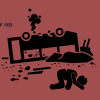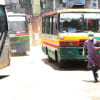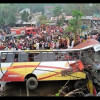Why are our roads still death traps?

Every month, Bangladesh witnesses a tragic procession of lives lost and irreparably altered due to road crashes. According to the latest report from the Bangladesh Jatri Kalyan Samity, in October alone, 475 people were killed and 815 injured in 452 crashes across the country. These statistics are alarming, but they barely scratch the surface of a systemic issue that has plagued Bangladesh for decades.
Road safety in Bangladesh is undermined by several interconnected issues, including unlicensed drivers, unfit vehicles, and inadequate enforcement of traffic laws. Over 10 lakh registered vehicles in the country are driven by unlicensed drivers because of a lack of institutional arrangement for proper training. Most drivers transition from helpers to drivers under the guidance of senior drivers, without formal certification.
In addition, more than five lakh registered vehicles lack fitness clearance, yet they continue to ply the roads unchecked. While significant investments have been made in road infrastructure, the capacity of the regulatory authorities like the Bangladesh Road Transport Authority (BRTA) remains woefully inadequate. According to Transparency International Bangladesh (TIB), the BRTA is one of the most corrupt institutions in the country, with widespread bribery facilitating the operation of unfit vehicles and unqualified drivers.
The situation is exacerbated by reckless driving, which often stems from the daily contract system for bus drivers. Under this system, drivers are incentivised to maximise passenger numbers, leading to dangerous competition and accidents. Similarly, the absence of separate lanes for slow-moving vehicles such as easy bikes and battery-powered rickshaws on highways contributes significantly to road crashes.
The popularity of motorcycles, driven by an inadequate public transport system and favourable government policies for production and sales, adds another layer of complexity. While motorcycles account for a significant number of road crashes, the enforcement of safety measures, such as use of helmets, remains lax. A report by the World Health Organization (WHO) highlights that proper helmet use can reduce the risk of death in a crash by six times. Yet, such measures are poorly implemented in Bangladesh, contributing to the country's high motorcycle-related fatality rate.
The term "structural killings" better describes the situation in Bangladesh—a failure of governance and systemic neglect that allows dangerous practices to persist. The vested interests of vehicle owners, transport associations, and regulatory bodies have created a tangled web of corruption and mismanagement that perpetuates this cycle of death. From 2014 to September 2024, there were 60,980 road accidents in the country, resulting in 105,338 deaths and 149,847 injuries. Despite a historic student-led movement in 2018 demanding safer roads, little has changed. The promises made by the authorities remain unfulfilled, and the death toll continues to rise.
The impact of road crashes extends far beyond the immediate loss of life. Families are left to grapple with emotional trauma, financial burdens, and the loss of breadwinners. Injured individuals often face long-term disabilities, resulting in reduced productivity and increased healthcare costs. The ripple effects of these tragedies are felt across society, undermining the nation's progress and prosperity. Addressing road safety in Bangladesh requires a multifaceted approach. These include enhancing BRTA's capacity to ensure strict enforcement of licensing and vehicle fitness requirements, as well as making the processes transparent, and taking anti-corruption measures to restore public trust.
Also, institutional arrangements for comprehensive driver training should be established, with mandatory certification for all drivers by replacing informal training practices with standardised, government-regulated programmes. Separate lanes for slow-moving vehicles on highways should be prioritised, along with pedestrian-friendly infrastructure including proper signage, lighting, and routine road maintenance. Campaigns can be run to educate citizens about traffic rules and the importance of safety measures, such as helmet and seat belts use. Traffic management systems should be modernised through technology, such as surveillance cameras and automated fines for violations to deter reckless driving. Owners of buses and other commercial vehicles must be held accountable for the actions of their drivers. The daily contract system should be abolished in favour of fair and regulated employment terms. Lastly, the interim government must place road safety high on its reform agenda.
Md Kawsar Uddin is associate professor in the Department of English and Modern Languages at the International University of Business Agriculture and Technology (IUBAT).
Views expressed in this article are the author's own.
Follow The Daily Star Opinion on Facebook for the latest opinions, commentaries and analyses by experts and professionals. To contribute your article or letter to The Daily Star Opinion, see our guidelines for submission.

 For all latest news, follow The Daily Star's Google News channel.
For all latest news, follow The Daily Star's Google News channel. 










Comments